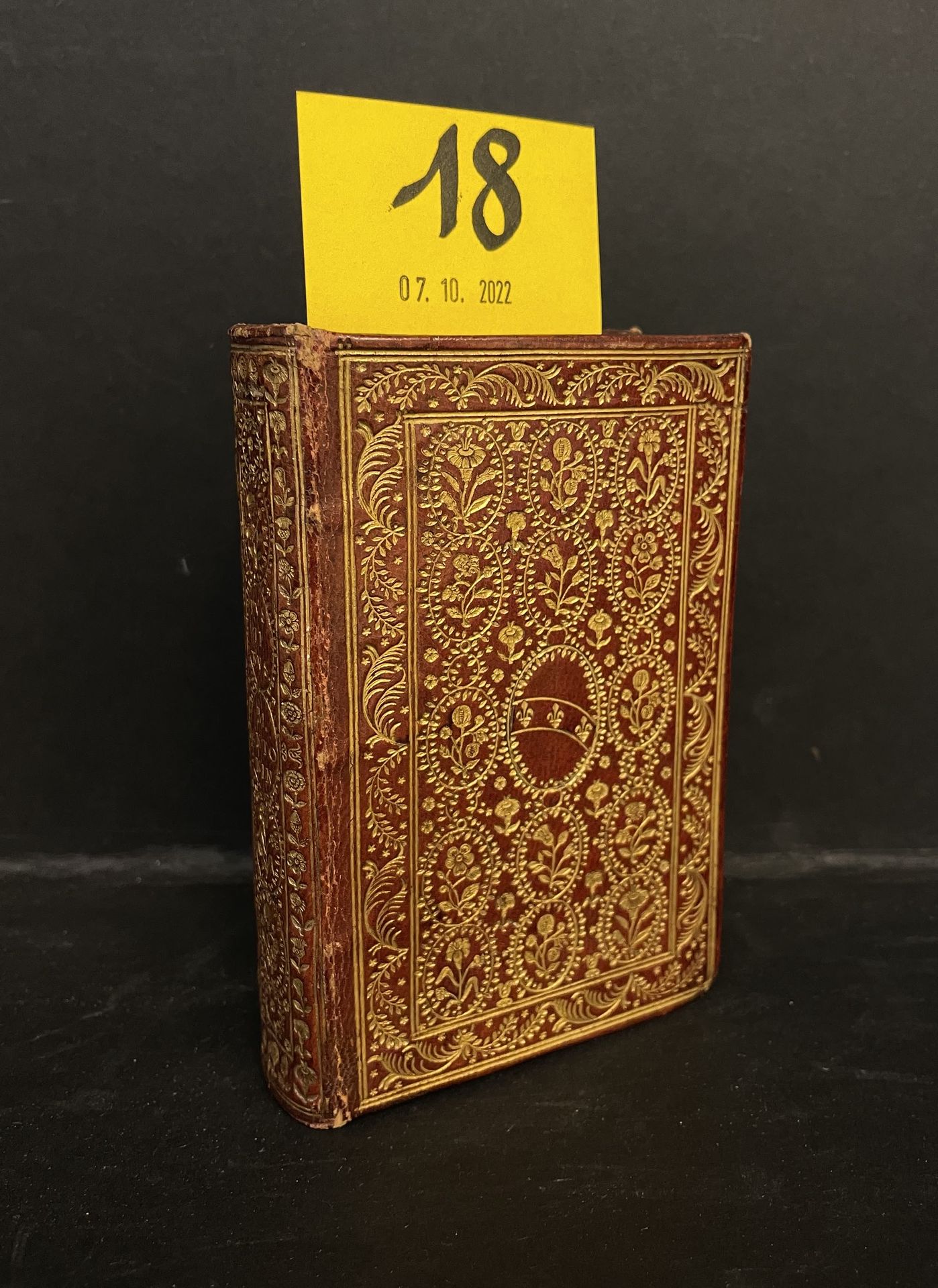Description
From the library of Pierre Duodo.- TROGUE POMPÉE.- Iustini ex Trogi Pompeii historiis externis libri XXXXIIII. (...) Paris, Jérôme de Marnef (name of the printer at the colophon : Étienne Prévosteau), 1585, in-16, 210-(20) leaves. Bound with : XYLANDER (Guillaume) - M. Antonini imperatoris romani, et philosophi De seipso seu vita sua Liber XII nunc primum editi, Guilielmo Xylandro. Followed by Marini Neapolitani de procli vita et felicitate (...) Lyon, Iohannes Tornaesius, 1559, in-16, 231-1 bl. p. The two volumes bound together at the time in full red morocco, boards decorated with a repetition of flowered medallions (thistles, lilies au naturel, daffodils), palm and foliage border, arms pushed in the central medallion of the first board, motto "Expectata non eludet" surrounding a three-flowered lily foot in the central medallion of the second, smooth spine decorated in the same way throughout, two medallions with title pushed in, filleted on the edges, gilt edges. Regulated copies bound together with the arms and motto of Pierre Duodo (1554-1611), in the elegant floral medallion binding, commonly attributed to the workshop of Nicolas and Clovis Eve, the king's bookbinders between 1578 and 1634. Ambassador of the Republic of Venice at the court of Henri IV from 1594 to 1597 and eminent bibliophile Duodo had a portable library of several hundred works, all bound in this style. Only the color of the morocco differed according to the subjects: red for religion and history, lemon for medicine and botany, olive for literature. These bindings were at one time attributed to Marguerite de Valois. L. Bouland, " Livres aux armes de Pierre Duodo, Vénitien et non pas de Marguerite de Valois ", Bulletin du bibliophile, 1920, p. 66-80 ; Hobson & Culot, n° 66. The work of Trogue Pompée is known to us only through the famous abridgement by Justin of his Philippics, which treats of all the countries conquered by Alexander the Great. The Histories of Trogue Pompey are completed by the De vita et moribus imperatorum romanorum by Giovanni Baptista Egnatio Veneto. William Xylander (1532-1576) was a German humanist and philologist. He translated Marcus Aurelius' Thoughts into Latin and, through his translations, made important contributions to the spread of mathematics.
18
From the library of Pierre Duodo.- TROGUE POMPÉE.- Iustini ex Trogi Pompeii historiis externis libri XXXXIIII. (...) Paris, Jérôme de Marnef (name of the printer at the colophon : Étienne Prévosteau), 1585, in-16, 210-(20) leaves. Bound with : XYLANDER (Guillaume) - M. Antonini imperatoris romani, et philosophi De seipso seu vita sua Liber XII nunc primum editi, Guilielmo Xylandro. Followed by Marini Neapolitani de procli vita et felicitate (...) Lyon, Iohannes Tornaesius, 1559, in-16, 231-1 bl. p. The two volumes bound together at the time in full red morocco, boards decorated with a repetition of flowered medallions (thistles, lilies au naturel, daffodils), palm and foliage border, arms pushed in the central medallion of the first board, motto "Expectata non eludet" surrounding a three-flowered lily foot in the central medallion of the second, smooth spine decorated in the same way throughout, two medallions with title pushed in, filleted on the edges, gilt edges. Regulated copies bound together with the arms and motto of Pierre Duodo (1554-1611), in the elegant floral medallion binding, commonly attributed to the workshop of Nicolas and Clovis Eve, the king's bookbinders between 1578 and 1634. Ambassador of the Republic of Venice at the court of Henri IV from 1594 to 1597 and eminent bibliophile Duodo had a portable library of several hundred works, all bound in this style. Only the color of the morocco differed according to the subjects: red for religion and history, lemon for medicine and botany, olive for literature. These bindings were at one time attributed to Marguerite de Valois. L. Bouland, " Livres aux armes de Pierre Duodo, Vénitien et non pas de Marguerite de Valois ", Bulletin du bibliophile, 1920, p. 66-80 ; Hobson & Culot, n° 66. The work of Trogue Pompée is known to us only through the famous abridgement by Justin of his Philippics, which treats of all the countries conquered by Alexander the Great. The Histories of Trogue Pompey are completed by the De vita et moribus imperatorum romanorum by Giovanni Baptista Egnatio Veneto. William Xylander (1532-1576) was a German humanist and philologist. He translated Marcus Aurelius' Thoughts into Latin and, through his translations, made important contributions to the spread of mathematics.
